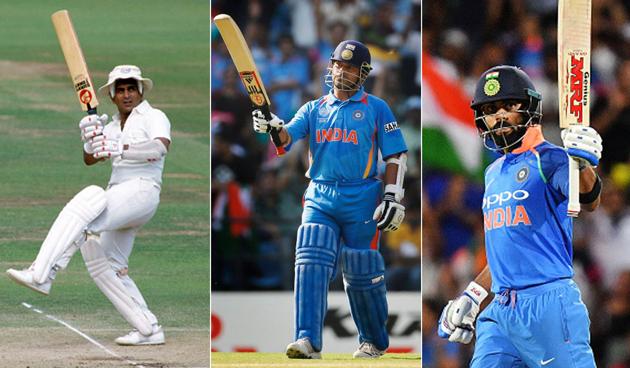Have huge admiration for him: Karsan Ghavri on comparisons between Gavaskar, Tendulkar and Kohli
One can’t help but estimate from his tone that Ghavri is a tad more inclined towards the batting of his former India teammate.
Karsan Ghavri, the former India left-arm pacer, is clear in his thoughts when he says he won’t be making comparisons between Sunil Gavaskar, Sachin Tendulkar and Virat Kohli. He feels drawing parallels between the three will be unfair given the vastly contrasting eras these batsmen played their cricket in. And yet, one can’t help but estimate from his tone that Ghavri is a tad more inclined towards the batting of his former India teammate.

Even though Ghavri calls Gavaskar, Tendulkar and Kohli champions of their respective generation, the former quick admires how Gavaskar batted fearlessly against the top teams in the world, at a time when each of them had a genuine fast bowler on pitches that were left uncovered.
Also Read | The ‘Fish & Chips’ story behind Sunil Gavaskar’s India captaincy
“All three of them are greats of the game, but one player I have always admired is Sunil Gavaskar. He played all his cricket on uncovered pitches and there were no restrictions on bouncers. Against all of that, he’s scored 34 centuries and 10000 runs, batting against brilliant attacks,” Ghavri told Hindustan Times.
“When he was playing, every team had a quality fast bowler – genuine and express. Australia had Dennis Lillee and Jeff Thomson; West Indies had five of them. England had Bob Willis. Pakistan had Imran and Sarfraz. New Zealand had Sir Richard Hadlee. As an opening batsman, he scored all those runs.
“There were no protective gears. When Sachin came around, or when Virat came in, the rules had changed.”
There is no doubt in Ghavri’s mind that Kohli is the best batsman in the world today, along with being a damn good captain. His record as captain for Royal Challengers Bangalore notwithstanding, Kohli has captained India in 89 matches, winning 62 and 24. However, despite an impressive win percentage of 71.83 percent, under Kohli, India have stuttered in big match scenarios, losing crucial knockout matches such as the final of the ICC Champions Trophy 2017 and the semifinal of last year’s World Cup.
Also Read | ‘You could not give a bad ball to him’: Anderson, Steyn recall bowling against Tendulkar
In fact, the knockouts are a hurdle India have not been able to cross since winning the 2013 Champions Trophy – their last ICC tournament win. Even under MS Dhoni, India lost the final of the 2014 World T20, the semifinal of the 2015 World Cup and the semifinal of the 2016 World T20 in India. Is that something to be worried about? Not as per Ghavri.
“But the Indian team is reaching the knockouts, right? See, over the years, right since 1983, we have entered so many finals, so many trophies we have won. I think it’s the habit of winning trophies which we have developed over the years, because of which we are not content as long as we do not have a trophy in hand - even if that means we tend to overlook the fact that the Indian team has done so well to reach the final four or final two. Playing all nine teams and topping the group in a World Cup is no mean feat,” he said.
“Look at the composition of the team. All 15-16 of them are match-winners. It’s no longer like it was in the early days, when cricketers made it into the team because let’s say he is the captain’s favourite. He who is in the team is on the basis of merit. But right now, it is totally performance-based.”
Looking back, Ghavri was unfortunate to not be part of what turned out to be India’s first-ever ICC knockout game – the semifinal of the 1983 World Cup – as he faded around early 1981. The two World Cups Ghavri was a part of were the first two editions in 1975 and 1979, where India performed miserably, winning just one match out of six combined. Of course, four years later, India did the unthinkable as created history as under Kapil Dev, they became world champions, but what changed in those four years?
“In those eight years from 75 to 83, we had no planning. We didn’t know how to play 60 overs Those first two world Cups. We had no clue, no idea,” Ghavri explained. “We never planned anything or had any strategies like which player to include against which team. The transformation happened after winning the 83 World Cup. This team started believing in themselves. The West Indies, Australia were all great teams.”






